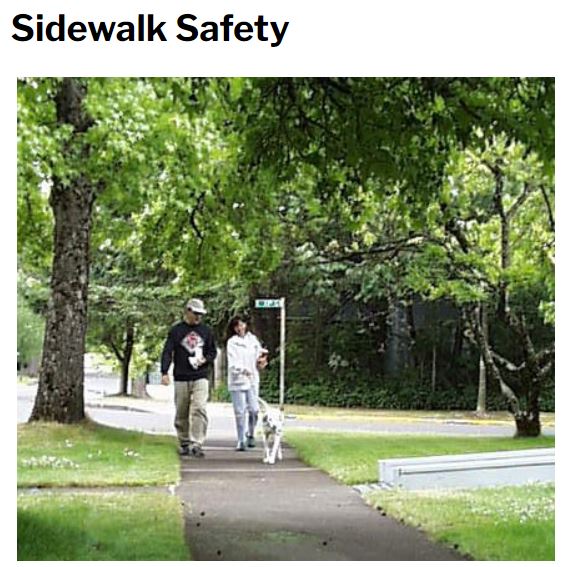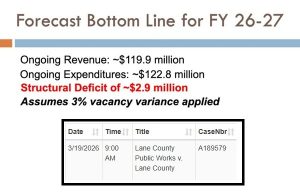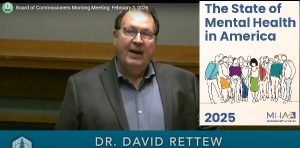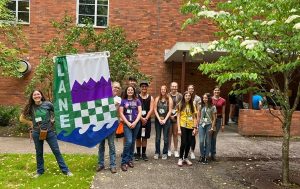Amazon Neighbors hear call for safer sidewalks
5 min read
Are more people getting injured after falls on the city’s uneven sidewalks? Are Eugene voters grumpy? Introducing the street bond at the Amazon Neighbors meeting, Allen Hancock.
[00:00:10] Allen Hancock: So how many people here lived here before 2008? Okay. About a third of you all. What was the condition of the streets before 2008? A show of thumbs (down). They were in really, really bad shape. They finally put a bond measure which would fund for repair of streets. And it seemed to be pretty successful.
[00:00:40] So the city went on the ballot again in 2012. And again, it passed. And this happened again in 2017.
[00:00:49] Each point along the way, there were some funds that were available for bicycling and walking; it was dedicated for that, but it was pretty small. So by 2017, we got that increased. It got up to (I think it was) about 9% of the total.
[00:01:05] But on this November’s ballot is another measure, but what makes it different is City Council has recognized that we have a climate recovery ordinance, that we have a Vision Zero policy to try to reduce injuries and traffic deaths, and that we have a system transportation plan that calls for tripling the amount of bicycling and walking in the next 12 years.
[00:01:32] So all together, city council said, ‘You know, we need to do something about this. And the bond measure is an appropriate place.’
[00:01:40] So this summer, with a lot of citizen involvement and encouragement, city council put forth a measure that will appear on a ballot in November primarily, again, for road repair.
[00:01:53] And I’ve got a list of projects. There is, for those of you who know this newspaper called the Register Guard, it’s still out there. They published this morning an article that specifies which streets would be repaired. And there are some in Amazon neighborhood, including the intersection of 29th and Harris, which is really patchy,
[00:02:19] I think a considerable amount of the funds, over 20% now, are going towards walking projects. In fact, the biggest chunk of the non-street repair is actually for walking projects. And that’s for $5 million over the course of five years. And then $3 million of it is going to bicycle projects. $2 million would go to safety projects. Then they also reserve a couple of million dollars for just sort of slush —that’s not a very—‘opportunity funding.’ We always called it slush funding. But sometimes you need to match a grant. They want to make something happen and they want to be able to have funds, so….
[00:03:02] So, as both a person who owns a car, drives a car, as well as a person who walks and rides a bike, I’m excited about the possibility that we could see more funding for active transportation.
[00:03:14] John Q: He admits to being worried about the mood of the voters.
[00:03:18] Allen Hancock: I imagine a number of you know what happened to Claire Syrett, who represented Ward 7 in the River Road neighborhood. She got recalled by the voters in her neighborhood over—well, there were a lot of things, but ostensibly, it has to do with transportation issues.
[00:03:36] So that’s a concern, that the overall sentiment of city residents might be—people might be grumpy. And even though the bond measure has passed three times in the past and there’s no change in the property tax assessment rate, that it’s the same amount as it was in the past, you just never know.
[00:03:55] Councilor (Alan) Zelenka was really insistent that city residents need to have the same level of assurance, same kind of accountability that has appeared with each of the three preceding bond measures where the street projects are listed.
[00:04:12] And so the resolution requires city staff to prepare a list of the walking and bicycling projects.
[00:04:20] John Q: Questions and comments from the Amazon Neighbors meeting.
[00:04:23] Kevin: Eugene is one of the few cities in the country that doesn’t include sidewalks as public infrastructure. Clearly it’s in the public right of way. It’s not on our private property, but we as property owners are responsible for fixing the broken uneven pavement.
[00:04:41] And Amazon neighborhood has lots of unsafe sidewalks. You can walk at night, start and trip, and then several great neighbors have gone around and spray-painted with bright paint those joints that you can trip over. When it is dark, you can’t even see those.
[00:04:57] So looking forward, can you imagine the city adopting a policy saying, ‘Yeah, sidewalks are part of our public infrastructure and should be funded in a bond cycle thing so we can have safe sidewalks.’
[00:05:11] Sharon: I’m Sharon. And I’d say, over the last five years, I want to say, every time I walk with friends, they talk about the sidewalk. And I have to make a decision whether I’m walking on the sidewalk or I’m walking in the street, at night or during the day, because of tripping factors.
[00:05:28] And I’m an occupational therapist, and I just want to say that there were so many people that fall within the year.
[00:05:35] I can’t tell you how many friends have fractured their wrist or fractured something. So it’s not just, ‘Oh, it’s the sidewalk’. It’s huge. It is huge how everybody talks about it.
[00:05:47] And it is probably, starting with age 60, or someone who has poor vision, or they might have peripheral neuropathy, or there’s all different reasons why people cannot walk on sidewalks that are not smooth. And they’re the ones who are paying out of pocket, thousands of dollars, and off work or whatever, because of that. So it is a real serious manner. We all circulate and talk about it.
[00:06:14] Julie Daniel: Julie Daniel. We did look at this fairly seriously. Most cities are the same as us. It is unusual for cities to have a mechanism that pays for the cities to do their sidewalks.
[00:06:25] But one thing that could be done which would not have cost is, that council could require that when a house is sold, that is part of the natural inspection that happens. A sidewalk report is given to the homeowner who’s going to buy that house. Because that way at least people would know.
[00:06:44] ‘Cause I think people are really shocked when somebody gets injured, or somebody complains about their sidewalk and they find that they are responsible. It’s a huge shock. And if it came when you bought the house, that, you know, you have a sidewalk problem here, then it would become part of, when a house is sold, that would come out of the sale price, is getting that sidewalk fixed. Because then the buyer was saying, ‘We’re not going to buy the house ’cause it’s a $10,000 sidewalk repair.’
[00:07:12] John Q: Allen Hancock talks with Amazon Neighbors about the Eugene streets bond. With more on the bond, David Monk conducted an informal survey among Southeast Neighbors on Spring Boulevard, Vine Maple and Pine Canyon. They all support the bond and would like to see their streets maintained.
[00:07:27] The city streets bond appears on your Nov. 8 ballot.







